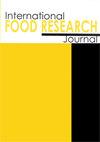利用香蕉花提取物合成绿色纳米银,并对其抗菌活性进行研究
IF 1
4区 农林科学
Q4 FOOD SCIENCE & TECHNOLOGY
引用次数: 0
摘要
以香蕉花提取物(BFE)为还原剂和稳定剂合成了纳米银。通过紫外-可见光谱(UV-vis)、透射电子显微镜(TEM)、x射线衍射(XRD)、傅里叶变换红外光谱(FT-IR)、热重分析(TGA)和zeta电位对制备的球形、分散良好、稳定的AgNPs进行了表征。研究了AgNPs对金黄色葡萄球菌和大肠杆菌的体外抑菌性能。AgNPs对金黄色葡萄球菌和大肠杆菌的最低抑制浓度(MIC)分别为32和16 μg/mL。由于大肠杆菌细胞壁结构的差异,大肠杆菌对AgNPs比金黄色葡萄球菌更敏感。关于AgNPs的杀菌机制,观察到细胞通透性增加和细胞形态的明显变形。随着抗氧化剂n -乙酰-l-半胱氨酸(NAC)的加入,抗菌效果下降,NAC具有清除ROS的作用。综上所述,抗菌机制可能是细胞膜损伤和ROS诱导的结合。本文章由计算机程序翻译,如有差异,请以英文原文为准。
Green synthesis of silver nanoparticles using banana flower extract, and their antibacterial activity
Silver nanoparticles (AgNPs) were synthesised using banana flower extract (BFE) as a reducing and stabilising agent. Spherical, well-dispersed, and stable AgNPs were formed and characterised by ultraviolet-visible spectroscopy (UV-vis), transmission electron microscopy (TEM), X-ray diffraction (XRD), Fourier-transform infrared spectroscopy (FT-IR), thermal gravimetric analysis (TGA), and zeta potential. The in vitro antimicrobial properties of AgNPs against Staphylococcus aureus and Escherichia coli were then investigated. The minimum inhibitory concentration (MIC) of AgNPs against S. aureus and E. coli were 32 and 16 μg/mL, respectively. E. coli was more sensitive to AgNPs than S. aureus due to differences in cell wall structures of the bacteria. Regarding the bactericidal mechanisms of AgNPs, an increase in cell permeability and a distinctive deformation in cellular morphology was observed. The antibacterial effect decreased with the addition of the antioxidant N-acetyl-l-cysteine (NAC) which acted as ROS scavenger. In summary, the antibacterial mechanism was likely a combination of cell membrane damage and ROS induction.
求助全文
通过发布文献求助,成功后即可免费获取论文全文。
去求助
来源期刊

international food research journal
Agricultural and Biological Sciences-Food Science
CiteScore
1.40
自引率
0.00%
发文量
75
期刊介绍:
The International Food Research Journal (IFRJ) publishes papers in English, six (6) issues a year with the coverage of:
Food Science and Technology
Nutrition and Dietetics
Agriculture, multidisciplinary
Chemistry, multidisciplinary
The scope of the Journal includes:
Food Science, Food Technology and Food Biotechnology
Product Development and Sensory Evaluation
Food Habits, Nutrition, and Health
Food Safety and Quality
Food Chemistry, Food Microbiology, Food Analysis and Testing
Food Engineering
Food Packaging
Food Waste Management
Food Entrepreneur
Food Regulatory
Post-Harvest Food Management
Food Supply Chain Management
Halal Food and Management
 求助内容:
求助内容: 应助结果提醒方式:
应助结果提醒方式:


